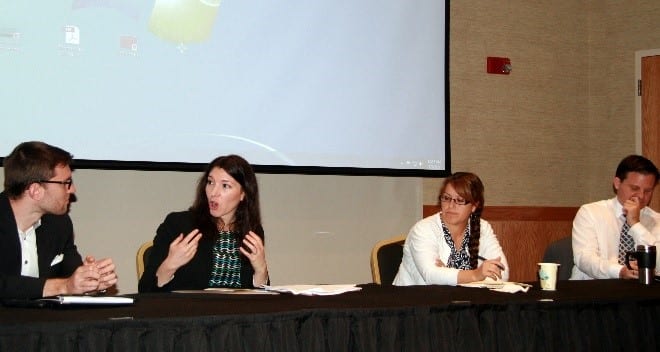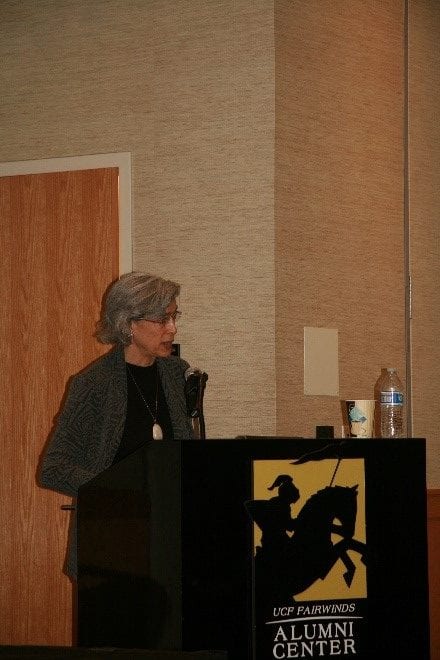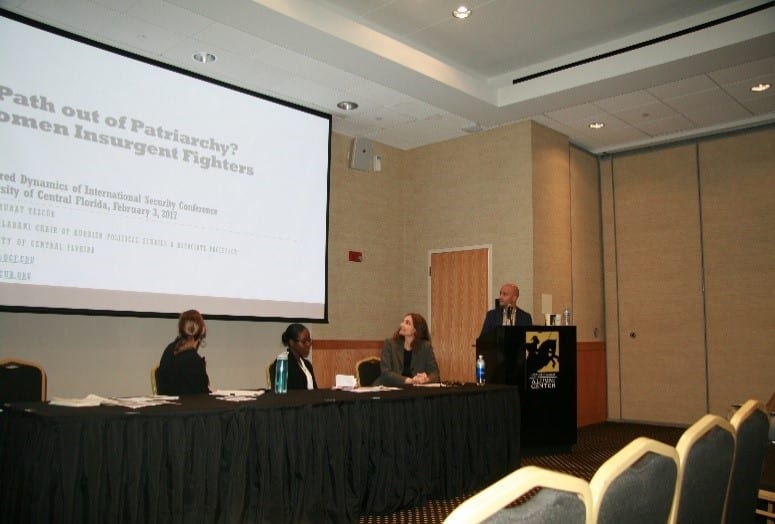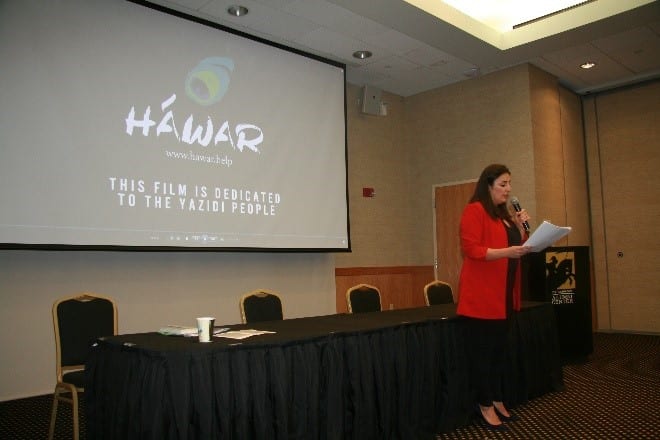A Unique Focus on Women and Conflict at UCF

Konstantin Ash, Dara Kay Cohen, Celeste Montoya, and Jonathan Powell
The Kurdish Political Studies Program (KPSP) and the Department of Political Science at the University of Central Florida hosted a conference titled “Gendered Dynamics of International Security” at UCF on Friday, February 3. The conference brought a distinguished group of scholars and a prominent journalist to UCF’s campus in Orlando. It offered unique perspectives into the role of women in armed conflicts and covered a wide range of topics such as women as fighters, peacekeepers, and victims in armed conflicts, sexual violence, and the relationship between gender equality and human security. A large group of UCF faculty, students and guests had the opportunity to listen to cutting-edge research on these topics as well as watch a documentary on sexual violence.
The College of Sciences Dean Michael D. Johnson, Ph.D., opened up the conference and emphasized that the notion that security does not only involve militarized violence but also wider themes such as environmental degradation, famine, and gender inequality. He commented that the conference enriches our understanding of security and addresses highly salient contemporary issues. Following Dean Johnson’s remarks, Kerstin Hamann, Ph.D., Pegasus Professor and chair of the Department of Political Science, argued how the conventional assumption of women and men behaving the same way in politics could be misleading. She added that women are not only victims of violence but also activists and agents of political change.

Elisabeth J. Wood
The first panel titled, “Gender, Violence, and Human Rights,” featured Dara Kay Cohen, Ph.D., Harvard University, Celeste Montoya, Ph.D., University of Colorado Boulder, and Jonathan Powell, Ph.D., UCF. Professor Cohen presented her research project involving a survey in Haiti about support for war, gender dynamics of gang violence, and the relationship between exposure to violence and prosocial behaviors. Professor Montoya’s presentation offered a critical discussion of the ways in which women’s rights are articulated could be used to justify structural ethnic and racial inequalities in Western countries. Finally, Professor Powell presented his research showing that women leaders in countries with higher levels of gender inequality are more likely to pursue aggressive policies. Professor Konstantin Ash, Ph.D., UCF, moderated the panel.
Professor Elisabeth J. Wood, Ph.D., of Yale University delivered the keynote titled “Sexual Violence during Wars.” She pointed out how perpetuators, victims, nature, and frequency of sexual violence exhibit significant variation. While some civil wars such as Rwanda and Bosnia were characterized by widespread and systematic rape, other conflicts did not have to similar levels of sexual violence. Professor Wood developed a conceptual framework to account for these different patterns and focused on conflict situations where rape is neither authorized nor ordered, but tolerated. In these situations, broader societal norms about gender relations, small group dynamics prevailing among fighters, and social-psychological dynamics of wars shape the scope and frequency of rape. Professor Wood concluded her talk emphasizing that rape is not inevitable in wars and suggested that holding commanders judicially accountable for the behavior of their fighters will be an important deterrent.

Theresa Schroeder, Jakana Thomas, Barbara Kinsey, and Güneş Murat Tezcür
The second panel, entitled “Women as Fighters and Peacemakers,” featured Jakana Thomas, Ph.D., Michigan State University, Theresa Schroeder, Ph.D., Radford University, and Güneş Murat Tezcür, Ph.D., UCF. Professor Thomas suggested that female suicide bombers are more lethal than male suicide bombers especially when attacking political and security targets. Professor Schroeder explored the support for female political leaders for humanitarian missions. Her analysis showed that women decision makers are in fact more likely to send troops to such missions. Professor Tezcür presented his findings showing that many Kurdish women joined the insurgent ranks as a way to escape from patriarchal relations such as arranged marriages. Professor Barbara Kinsey, Ph.D., of UCF moderated the panel.

Düzen Tekkal
The day ended with an exclusive showing of Hawar: My Journey to Genocide, a documentary about the plight of Yazidi Kurds in the hands of the self-styled Islamic State (IS) in northern Iraq in the summer of 2014. The IS assault resulted in the deaths and sexual enslavement of thousands of Yazidi Kurds as well as forced recruitment of Yazidi children as IS fighters. Hawar tells their story from the lenses of Düzen Tekkal, a prominent German journalist with Yazidi-Kurdish heritage. Tekkal is the first journalist who featured Nadia Murad Bassee, a Yazidi woman who escaped the IS and became an U.N. Goodwill Ambassador, in her documentary. Following the show, Tekkal answered questions from the audience and discussed her own visceral experiences of rediscovering the roots of her identity in a time of tragedy for the Yazidi people.

Q & A Session with Tekkal
The conference was organized by Güneş Murat Tezcür, Jalal Talabani Endowed Chair of Kurdish Political Studies and associate professor, and Jonathan Powell, assistant professor, from the Department of Political Science. The co-sponsors are College of Graduate Studies, Global Perspectives, Middle Eastern Studies, and International Relations Club.
